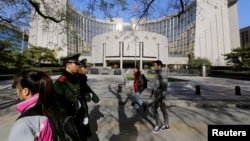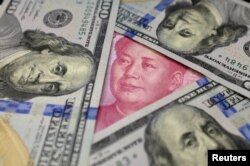The Chinese yuan fell against the dollar Monday, following losses Friday. The decline underlines the foreign exchange management challenges for Beijing, which is worried about U.S. President-elect Donald Trump's threat to declare China a currency manipulator. The slide came after the the People's Bank of China (PBOC), the central bank, reset the trading range lower to save the yuan from a market thrashing and a possible currency crisis, analysts said.
The slide in the yuan's offshore value is the worst slide since last June. It came soon after Beijing imposed foreign exchange restrictions on Chinese buying properties overseas, demonstrating how difficult it is for China to check capital flight, an important cause of the fall in the value of the yuan or RMB, the abbreviated form of renminbi.
“The PBOC probably wants to avoid that an RMB slide becomes a one-way bet for the market, as this would make the pressure for further declines much harder to resist,” Jacob Kirkegaard, senior fellow at the Peterson Institute of International Economics told VOA.
While the central bank might be unwilling or unable to intervene constantly to prop up the RMB exchange rate, if it can make the market unpredictably volatile, it might make it hard for traders to gamble on RMB falling further, Kirkegaard said.
The yuan fixed trading mid-range was 6.9262 to the dollar Monday, compared with 6.8668 on Friday. China allows the yuan to trade two percent up or down from its fixed mid-range each day.
Protection money
China usually spends a huge amount of money to protect the yuan from falling, and even pushes it up occasionally. The yuan strengthened against the dollar for a couple of days last week. This is why the POBC's decision to allow the currency to slide for two days is significant.
Chinese officials have indicated Beijing is now rationing what it spends to protect the economy and is allowing the yuan to float close to realistic levels because it has already lost a significant portion of its foreign currency. Foreign currency reserves have fallen to around $3 trillion from $4 trillion in 2014. During that time, the U.S. dollar exchange rate has dropped by nearly one yuan.
The State Administration of Foreign Exchange (SAFE) has issued new rules to control the use of foreign currency and has prepared a blacklist of people who have sent large amounts of money out of the country. Those on the list may be barred from converting RMB into foreign currency, state media said.
Chinese authorities fear that capital flight from China, the strengthening dollar and possible adverse moves by Trump might result in a severe beating for the yuan in the coming weeks.
"If the RMB drops suddenly very fast [as opposed to a slower managed decline], confidence among Chinese savers may collapse and the ability of Chinese firms to service foreign denominated debts may become difficult," Kirkegaard said. "It is hence imperative for the Chinese government to ensure that any downward movement in the RMB become gradual, rather than panicky."
In recent weeks, banks have been asked to report all cash transactions exceeding 50,000 yuan ($7,200) to the central bank; the previous threshold was 200,000 yuan.
Rising outflows
“The domestic capital outflows in 2016 are expected to exceed $160 billion this year, up from $100 billion in 2015. The growth rate is too fast, not to mention that a big part of that cash flow might be illegal,” Dong Dengxin, director of the Finance and Securities Institute at Wuhan University of Science and Technology, told Chinese journalists.
Capital flight is both the cause, and result of weakening currency. Funds flow out of China because people are pessimistic about the economy and want greater returns on their assets. This drives down the yuan, triggering a vicious cycle in which Chinese investors seek foreign investments to protect themselves against the weakening yuan.
“Chinese are converting their RMB savings into dollars and investing abroad. When Chinese convert RMB into dollars, China uses its U.S. dollar holdings to buy the yuan. If it did not do so there would quickly be an imbalance between buyers and sellers of yuan and the value of the yuan would plummet,” said Paul Gillis, professor of accountancy at the Peking University's Guanghua School of Management.
Market sources expect the yuan to further weaken against the dollar, despite government efforts to prop it up. The strengthening dollar and possible adverse actions against Chinese business by the next U.S. president might batter the currency in the coming weeks.
“I think the dollar will continue to strengthen and hence the pressure on the RMB to fall continue as the Fed raises interest rates. Only when the U.S. economy performs worse than expected will the dollar stop rising and pressure on the RMB ease,” Kirkegaard said. “I expect Beijing to continue to tighten capital controls in the near term to try to conserve as many forex reserves as possible.”





